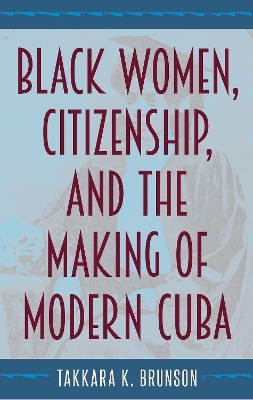
Black Women, Citizenship, and the Making of Modern Cuba
Seiten
2021
University Press of Florida (Verlag)
978-1-68340-208-4 (ISBN)
University Press of Florida (Verlag)
978-1-68340-208-4 (ISBN)
Traces how women of African descent battled exclusion on multiple fronts but played an important role in forging a modern democracy. Takkara Brunson takes an intersectional approach to the history of the era, examining how Black women's engagement with Cuban citizenship intersected with racial prejudice, gender norms, and sexual politics.
In Black Women, Citizenship, and the Making of Modern Cuba, Takkara Brunson traces how women of African descent battled exclusion on multiple fronts but played an important role in forging a modern democracy. Brunson takes a much-needed intersectional approach to the political history of the era, examining how Black women's engagement with questions of Cuban citizenship intersected with racial prejudice, gender norms, and sexual politics, incorporating Afro-diasporic and Latin American feminist perspectives.Brunson demonstrates that between the 1886 abolition of slavery in Cuba and the 1959 Revolution, Black women-without formal political power-navigated political movements in their efforts to create a more just society. She examines how women helped build a black public sphere as they claimed moral respectability and sought racial integration. She reveals how Black women entered into national women's organizations, labor unions, and political parties to bring about legal reforms. Brunson shows how women of African descent achieved individual victories as part of a collective struggle for social justice; in doing so, she highlights how racism and sexism persisted even as legal definitions of Cuban citizenship evolved.
In Black Women, Citizenship, and the Making of Modern Cuba, Takkara Brunson traces how women of African descent battled exclusion on multiple fronts but played an important role in forging a modern democracy. Brunson takes a much-needed intersectional approach to the political history of the era, examining how Black women's engagement with questions of Cuban citizenship intersected with racial prejudice, gender norms, and sexual politics, incorporating Afro-diasporic and Latin American feminist perspectives.Brunson demonstrates that between the 1886 abolition of slavery in Cuba and the 1959 Revolution, Black women-without formal political power-navigated political movements in their efforts to create a more just society. She examines how women helped build a black public sphere as they claimed moral respectability and sought racial integration. She reveals how Black women entered into national women's organizations, labor unions, and political parties to bring about legal reforms. Brunson shows how women of African descent achieved individual victories as part of a collective struggle for social justice; in doing so, she highlights how racism and sexism persisted even as legal definitions of Cuban citizenship evolved.
Takkara Brunson is assistant professor of Africana studies at California State University, Fresno.
| Erscheinungsdatum | 09.06.2021 |
|---|---|
| Zusatzinfo | 6 black & white illustrations |
| Verlagsort | Florida |
| Sprache | englisch |
| Maße | 152 x 229 mm |
| Gewicht | 552 g |
| Themenwelt | Geisteswissenschaften ► Geschichte ► Allgemeine Geschichte |
| Geisteswissenschaften ► Geschichte ► Regional- / Ländergeschichte | |
| Sozialwissenschaften ► Soziologie ► Gender Studies | |
| ISBN-10 | 1-68340-208-1 / 1683402081 |
| ISBN-13 | 978-1-68340-208-4 / 9781683402084 |
| Zustand | Neuware |
| Haben Sie eine Frage zum Produkt? |
Mehr entdecken
aus dem Bereich
aus dem Bereich
eine Familiengeschichte der Menschheit
Buch | Hardcover (2023)
Klett-Cotta (Verlag)
CHF 68,60
Eine wahre Geschichte von Schiffbruch, Mord und Meuterei
Buch | Hardcover (2024)
C.Bertelsmann (Verlag)
CHF 34,95


